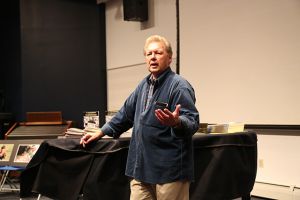
Cabrini Students and faculty were treated to an insightful afternoon dedicated to the education regarding injustices some say the United States funds.
With justice being an integral part of the fabric of Cabrini, all can learn from someone like Roy Bourgeois, a human rights activist and founder of the School of Americas Watch.
As an opening during the Monday, Oct. 14, 2013, talk in Widener Lecture Hall, Roy Bourgeois reflected on the injustice that he was involved in as a child in his own church and believes even the Church can continue to perpetrate injustices. “We were making God our partner in racism,” Bourgeois said.
A Vietnam veteran, Bourgeois learned many things from his stint over seas. “Simply we are not made for war,” Bourgeois, the defrocked-priest, said. “Our loving creator gave us a conscience. We have a heart that often has compassion in it and we cannot go about the business of killing and go on with life as before.”
Bourgeois believes we need others to awaken us, during our lives. It was the poor and injured Vietnam orphans, or teachers as he called them, which helped Bourgeois to confront ignorance, prejudice and a lack of wisdom.
It was not until his final leg of his tour in Vietnam that he felt God calling him to the priesthood. After researching the Maryknoll Fathers and Brothers, Bourgeois was filled with hope.
“My four years in the military were going to be up and I was going to be joining the Maryknoll Fathers and Brothers. I was filled with hope. The hope continues today,” Bourgeois said.
Following several years of reflection and preparation, Bourgeois was ordained and sent to service the poor in the western part of South America, Bolivia. As the children in Vietnam once taught him, now so did the Bolivian people.
“They taught this gringo so much, especially about their struggle—their lives. Most of the people in Bolivia are struggling for survival—living on the edge,” Bourgeois said.
Protecting the United States’ economic interests and exploiting the poor through funding the brutal dictatorship that controlled Bolivia, it upset Bourgeois to know that the struggling they endured was at the hands of his own country.
“There is a lot of money to be made by exploiting cheap labor in these countries,” Bourgeois said.
Bolivia is where Bourgeois learned liberation theology. It is a theology that empowers the poor and teaches a God of love, which was contrary to what he learned in his church in Louisiana. This interpretation of Christianity begins with the idea that no one is to live in poverty, be subject to injustice or a victim of violence.
“It is through all this liberation theology that came the all important word solidarity,” Bourgeois said. “It’s the idea of making someone else’s struggle, your struggle.”
After being arrested and deported from Bolivia, and his attempts of returning thwarted, Bourgeois set his sights on El Salvatore. Like Bolivia, the center of El Salvatore’s strength came from the United States. The El Salvadorian soldiers were being trained in the School of the Americas, an institution located within the walls of the United States Army post, Fort Benning, Georgia.
“Giving guns and training to those doing the killing. This is all being done in our name, with our taxes,” Bourgeois said.
The vast majority of U.S. citizens are unaware of the untold suffering on the receiving end of the United State’s foreign policies. “Our greatest enemy in this country is ignorance,” Bourgeois said.
Hoping that someday, all the people Bourgeois speaks to will reach a moment in their lives where they will do acts of civil disobedience for the pursuit of justice. “We have to follow our conscious. Our actions are rooted in our experiences,” Bourgeois said. “How sad it is if we go through life and at the end we look back and we lived our lives so unthreateningly.”
Bourgeois has taken his own advice, and though he has been sent to prison several times, he believes it has all been for good reasons. “We were sent to prison for a year and a half, no regrets. It was the best retreat—I think, that I ever made,” Bourgeois said. Prison did not keep him back, once he was out, he went back to work in hopes of ending the injustice surrounding Fort Benning.
Aside from creating documentaries and speaking to universities, in 1990 Bourgeois created the School of Americas Watch. This advocacy organization’s mission is to nonviolently protest the unjust actions of the School of Americas. Every November on the weekend before Thanksgiving, Bourgeois stages a protest at the front gates of Fort Benning where a group of Cabrini students will be attending this fall.
“When we gather, it’s a big celebration of hope,” Bourgeois said. Speakers, musicians and students come together to realize the connectivity between all the injustices in the world, not merely the mission of SOA Watch.
While carrying white crosses and photographs, the weekend long protest ends with Sunday’s silent funeral procession. When the march meets the large gates of Fort Benning, white crosses and pictures are fastened between the posts of the tall barbed wire fences.
In recent time, Bourgeois has made great strides towards the extinction of the injustice surrounding the Western Hemisphere Institute for Security Cooperation, succeeding title of the SOA. Even though succeeding at pushing six countries to withdrawal their use of the institution, the recent bill in congressional bill, HR2989, is more exciting in his opinion.
The purpose of the bill is to suspend the authority of the Western Hemisphere Institute for Security Cooperation’s, and begin investigations in response to human rights violations through the institute.
Roy Bourgeois has made it the hallmark of his life to fight inequality and hopes all can help him.
Bourgeois said, “I don’t know what can be more important in life, than working for peace and struggling for justice. Struggling for equality.”




